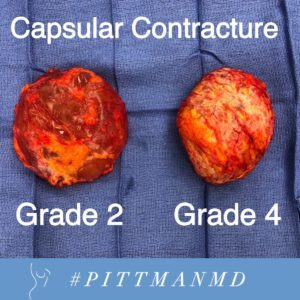Patients experiencing symptoms like breast stiffness, pain, and deformity after a breast augmentation may be in need of capsular contracture treatment in Washington, DC. Dr. Troy Pittman provides breast revision surgery to correct many conditions, including contracture.
What is Capsular Contracture?
The formation of a capsule around a breast implant is part of normal wound healing. The body’s natural response to a foreign object is to form a thin layer of scar tissue around the implant. However, in capsular contracture, that thin layer of scar tissue becomes thicker and causes a problem in women with breast implants. This problem occurs at four different grades:
- Grade 1 – This is the normal response to the breast implant. The capsule is soft and the presence of the capsule is imperceptible to the patient or her plastic surgeon.
- Grade 2 – There is thickening of the capsule which causes the implant to feel firmer when the breast is examined or manipulated. However, the presence of the thickened capsule does not change the look of the breast.
- Grade 3 – The thickening of the capsule becomes worse and the presence of the capsule, in addition to making the breast firm, causes a deformity of the breast that changes the overall look of the breast. The breast mound commonly appears to have moved upward and the implant appears narrowed.
- Grade 4 – This is the most severe form. The capsule becomes so thickened that it is visible, palpable and causes the patient pain.

Commonly, once capsular contracture reaches Grade 3 and 4, it is recommended that the patient undergo revision breast surgery to treat the condition.
Dr. Pittman Discusses Capsular Contracture

What Causes Capsular Contracture?
There are a number of theories as to why some patients experience capsular contracture and others do not. It is likely that this development is multi-factorial.
Genetics
Some believe that there is a genetic component. Patients that form increased scar tissue or have a history of autoimmune inflammatory conditions may be at an increased risk.
Bio-Films
There is recent evidence to suggest that capsular contracture can be caused by a “bio-film.” A bio-film is a thin layer of bacteria that adheres to the implant, causing a low-level inflammatory condition that is not severe enough to cause the patient to feel ill. However, the chronic presence of the bacteria can cause an inflammatory response that leads to contracture.
Post-Operative Issues
Certain other circumstances such as a post-operative hematoma or seroma can lead to capsular contracture. It is important to remember that inflammation begets inflammation so any circumstance that induces an inflammatory response can lead to thickening of the capsule.
Breast Implant Safety
It is important to note that this development has NOTHING to do with breast implants being unsafe or dangerous. In all of the 10-year core studies that the FDA required implant manufacturers to complete, the incidence of this condition is about 2% per year. Therefore at 10-years, there is about a 20% chance that a patient with implants will develop Grade 2-4 capsular contracture. It is important to note that 75% of incidents occur in the first 2-years after surgery.
Can a Surgeon Help Prevent Capsular Contracture?
In many cases, the formation of this condition is random and could be considered “bad luck.” However, there are many steps that can be taken to reduce the risk of developing the condition.
- Careful patient selection. Patients that have a history of severe scar formation or adhesion formation after abdominal surgery should be counseled on the increased risk of developing capsular contracture. Additionally, patients at high-risk for developing hematomas such as those with bleeding disorders or patients that are actively smoking should be screened appropriately.
- Meticulous sterile technique in the OR. It is important to have minimal handling of the implant during the operation. Precautions are taken to assure that the pocket is irrigated with antibiotic solution to help decontaminate the pocket and minimize the amount of residual bleeding in the implant pocket. I use a device called the Keller Funnel which allows me to insert the implant through a tiny 3-cm incision without directly touching the implant.
- Textured Implants. It has been reported that there is a lower-incidence of capsular contracture when textured implants are used. The texturing on the implants (versus smooth implants) makes it more difficult for the body to form scar tissue around the implant.
- Sub-Muscular implant position. The breast gland is inherently non-sterile. Placing the implants under the muscle isolates the implant from the breast gland which theoretically can lead to a lower chance that the pocket becomes contaminated with bio-film. Having said that, there are some cases where placing the implant in from of the muscle is preferable. Every patient is different and the risks and benefits of each type of implant position should be discussed during a consult with a Board-Certified Plastic Surgeon.
How is Capsular Contracture in Washington DC Treated?
In Grade 1 and 2, no treatment is needed. If the implant pocket starts to feel firm and a smooth implant has been used, I recommend implant massage for two minutes a day. This can help with prevention of scar tissue formation. However, implant massage is not recommended for patients with textured implants.
With patients who have developed Grade 3 or 4 capsular contracture, surgery or other treatment procedures must be performed. Revision breast surgery is typically recommended. In most cases, this involves removal of the implant and complete removal of the breast capsule. Removing the implant without removing the capsule is counterproductive. In some circumstances, the patient may choose to her implants permanently removed. Most times, a small mastopexy or augmentation/mastopexy is necessary if implants are removed and/or replaced. Viewing before and after photos will help patients better understand the results of these corrective techniques.
After the chosen surgery has been performed, the patient will need to undergo a period of healing and recovery. This can involve a degree of swelling and bruising. During this time, it will be important to follow Dr. Pittman’s post-surgical care directions diligently.
It is important to note that once a patient has developed severe capsular contracture, her chances of it recurring are doubled. So at 10 years, her chance of having another contracture is close to 50%. There are certain things that can be done to help prevent it from happening again:
- Changing from a smooth to textured implant
- Changing the implant position, if it was on top of the muscle to under the muscle
- Use of some type of Acellular Dermal Matrix
It is also important to note that implants that are too large for the patient out stress on the breast gland and can lead to a capsular contracture. Many times, I recommend downsizing to a smaller implant in revision surgery.

Capsular Contracture Surgery Cost
Before the price of a breast revision procedure can be determined, it will be necessary to understand the details of the specific case and the techniques that will be employed for correction. Once the exact techniques have been chosen, the treatment cost can be discussed in further detail during a consultation.
Learn Your Options Regarding Capsular Contracture in Washington DC
Ultimately, the best way to know your options is to book a consult with Dr. Pittman and discuss your goals. In your consult, Dr. Pittman will perform a physical exam and may perform an ultrasound exam. If there is a concern about breast implant rupture, Dr. Pittman may send you for a breast MRI and/or mammogram. The cornerstone of Dr. Pittman’s practice is treating each patient as an individual and devising a concierge surgical plan for each patient.
Schedule your consultation for capsular contracture treatment in Washington, DC – contact us today to arrange your appointment.

